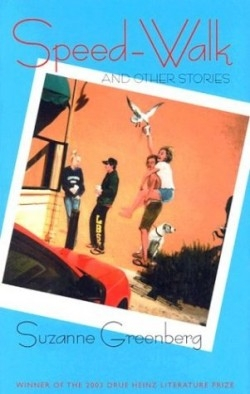Speed-Walk
and Other Stories
Failed intimacy is the repeated theme in this collection of poignant and yet occasionally comical short stories, winner of the 2003 Drue Heinz Literature Prize. Whether between spouses, parents and children, or even friends, intimacy in these stories appears to be something clumsily aimed for and sadly missed.
“Two months after my wife, Becky, died, I went on my first speed-walking date,” says a recent widower in the title story. He tries dating a woman who turns everything into exercise, even time in the hot tub, but how does one become intimate when the other person is speed-walking? Even his attempt to forge a link with the new woman’s daughter and grandchild, by helping the daughter enter a beauty contest with her child, fails, and only serves to remind him of his lost happiness with his wife.
The perverted intimacy of an older stranger, Chicken Man, ruins Victoria’s fifth birthday party in “Two Parties”: after chasing her round the park, he whispers that he’s “getting out the sand” when he runs his hand inside her panties, while her parents are off for a walk through the park to remember her conception and get “straight with our priorities.”
In “Naked Lake,” the only intimacy possible for a woman with her abusive husband is to watch the next-door neighbor as she stands naked in her bathroom washing. “We just stood together, watching her for a long time. Jimmy, I knew, was in a kind of trance, the way I had been, and I didn’t want to let him know what I was thinking. I was thinking about that time at Naked Lake, the last time we went there, right before we got married, how Jimmy promised me it would never happen again.”
The author teaches English at California State University in Long Beach, where she lives with her husband and three children. She has previously co-authored a non-fiction book, Everyday Creative Writing: Panning for Gold in the Fiction Sink. Her fiction, essays and poetry have appeared in several publications, including Mississippi Review and The Washington Post Magazine.
Here, her stories are a juxtaposition of the melancholy and the mundane, with a little of the absurd thrown in (like the old woman who insists on helping a young boy traveling alone and causes him to get off at the wrong train stop), evoking a sense of frustration with the protagonists. For, as everyday as their environments and situations are, they can never get relationships, intimacy, or happiness quite right, and the reader is left impatient but sympathetic, hoping that fiction remains fiction.
Reviewed by
Paula Scardamalia
Disclosure: This article is not an endorsement, but a review. The publisher of this book provided free copies of the book to have their book reviewed by a professional reviewer. No fee was paid by the publisher for this review. Foreword Reviews only recommends books that we love. Foreword Magazine, Inc. is disclosing this in accordance with the Federal Trade Commission’s 16 CFR, Part 255.

